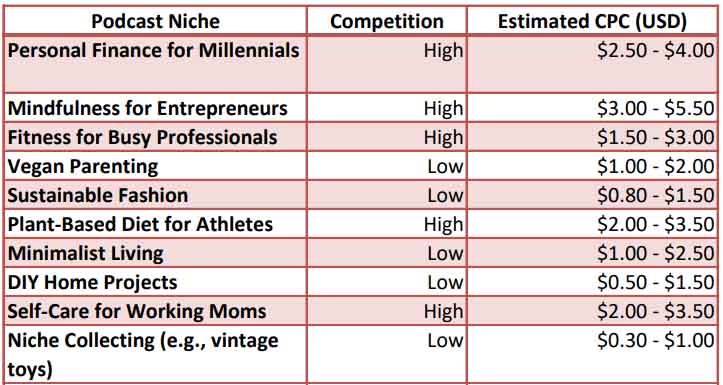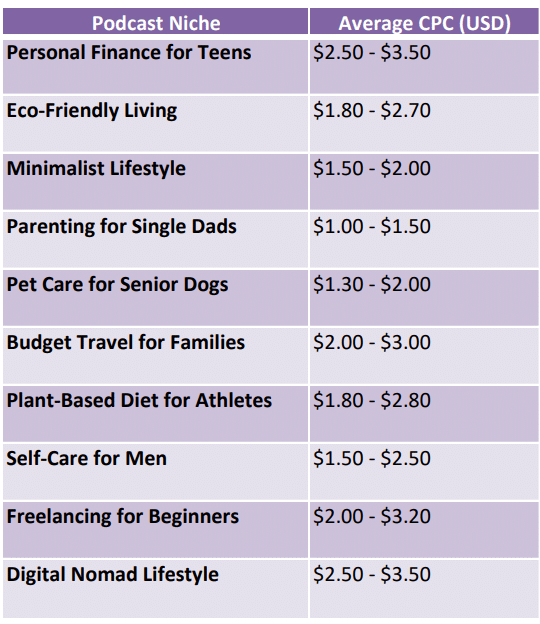Nowadays everyone is very careful about their work. If you have not 2-step ahead then definitely you will be back. Before starting podcasting know How to find the perfect podcast niche on your expertise. Read carefully also get 11 small podcast Niches that have scope till date.

Introduction: How to find the perfect podcast niche
Finding the perfect podcast niche can feel overwhelming, especially for beginners. Many new podcasters dive into broad topics, hoping to attract more listeners. However, this approach often leads to frustration. Without a clear niche, it’s hard to stand out or connect with a loyal audience.
Choosing the right podcast niche is crucial for success. A well-defined niche allows you to focus on a specific audience. It helps build stronger connections with listeners who are genuinely interested in your content. This leads to a more engaged and loyal following, making your podcast grow faster.
Related Post: How to Create the Perfect Podcast Studio at Home
Why a Podcast Niche Matters
A podcast niche matters because it helps you focus on a specific topic that interests a particular group of people. When you choose the right niche, it becomes easier to connect with your audience. Instead of trying to appeal to everyone, you speak directly to listeners who are genuinely interested in your content. This builds trust and makes your podcast feel more personal.
One big advantage of having a podcast niche is that it helps you stand out in the crowded world of podcasting. There are thousands of shows out there, and without a clear niche, it’s hard to get noticed. But when you focus on a specific subject, listeners looking for that content will find your show more easily. This makes it simpler for your podcast to grow.
Another benefit is that a niche allows you to build a loyal audience. When listeners feel like you understand their needs and interests, they are more likely to stick around and listen to future episodes. They may even recommend your podcast to others who share the same passion. This leads to organic growth without spending too much on marketing.
Choosing a podcast niche also makes content creation easier. When you know what your podcast is about, it’s simpler to come up with episode ideas. You don’t waste time thinking about random topics because you have a clear focus. This saves time and keeps your content consistent, which is important for long-term success.
Small Podcast niches List with high CPC
how to Identifying your Interests and Passion
When you choose a topic you genuinely enjoy, it makes podcasting more fun and sustainable in the long run. Think about the things you love talking about with friends or topics you never get tired of exploring. These are usually good indicators of your interests.
- One of the main advantages of picking a niche based on your passion is that it keeps you motivated. Podcasting requires consistency, and if you’re not passionate about the subject, you’ll quickly lose interest. When you love the topic, creating content feels less like work and more like sharing your enthusiasm with others. This helps you stick with it, even during tough times when the growth might be slow.
- Another benefit is that your passion comes through in your episodes. Audiences can tell when a host is truly interested in what they are talking about. Your energy and excitement will naturally attract listeners. People are more likely to engage with a podcast when they feel the host is genuinely invested in the topic. This creates a deeper connection with your audience, which is crucial for building a loyal listener base.
Choosing a niche based on your interests also makes content creation easier. You don’t have to force yourself to research things you don’t care about. Instead, you already have a strong foundation of knowledge or a desire to learn more. This saves time and makes it simpler to come up with new episode ideas. The more comfortable you are with the subject, the better you can explain it to your audience, making your podcast more informative and engaging.
How do I analyze Market Demand
Analyzing market demand is important when you are trying to find the perfect podcast niche. It helps you understand if there is an audience for your chosen topic. If no one is interested in your niche, it will be hard to grow your podcast, no matter how passionate you are. So, before you start, it’s smart to check if people are searching for or listening to podcasts about your chosen subject.
- The first step in analyzing market demand is to look at existing podcasts in your niche. You can go to podcast directories like Apple Podcasts or Spotify and search for topics you are interested in. If you see several popular podcasts on that topic, it’s a good sign that people are interested. However, if there are too many, the niche might be oversaturated. You’ll need to find a way to stand out by offering something unique.
- Another way to check market demand is by using online tools like Google Trends or keyword research tools. These tools show you how many people are searching for topics related to your niche. If the search volume is high, that means there’s interest. If the search volume is low, it might be harder to attract listeners. This helps you decide whether your niche is worth pursuing or if you need to adjust it.
You can also analyze market demand by joining online communities, like social media groups or forums, that focus on your potential niche. Look at what people are discussing, what questions they are asking, and what topics they are most passionate about. This can give you a better idea of what your audience wants to hear. Engaging with these communities can also help you build your podcast’s early audience.
Focusing on Expertise or Experience
When you build a podcast around what you already know or have experience in, it gives you credibility. People are more likely to listen to a podcast when they feel the host is knowledgeable. Your expertise makes your podcast more valuable because you can provide insights that others might not have.
- One of the main advantages of focusing on your experience is that it makes content creation easier. Since you already know a lot about the topic, you don’t have to spend hours researching for every episode. You can share your personal stories, lessons, and tips that come naturally from your experience. This makes your podcast more engaging and authentic, as listeners appreciate real-world knowledge over dry, researched facts.
- Another benefit is that your expertise sets you apart from other podcasts. Many podcasts cover the same broad topics, but when you bring your unique experience to the table, it adds a personal touch. Whether it’s your career, hobbies, or life challenges, these experiences give your podcast a fresh perspective. This helps you stand out in a crowded market and attract a loyal audience.
If you are not an expert in a field, don’t worry. You can still focus on a niche where you are learning or gaining experience. Many listeners enjoy following someone’s journey. You can share your growth, mistakes, and what you’re learning along the way. This makes your podcast relatable and helps others who are going through the same experiences.
Testing and Refining Your Niche
Testing and refining your podcast niche is an important step to ensure your podcast reaches the right audience. Even if you think you’ve found the perfect niche, it’s smart to test it out first. This helps you see what works and what doesn’t. It also gives you the chance to make changes early on before you’ve invested too much time.
Start by creating a few episodes around your chosen niche. This is the easiest way to test your niche in real-time. You’ll be able to see how your listeners react, which episodes get more downloads, and what topics they engage with. Pay attention to the feedback you get. If listeners are enjoying your content and coming back for more, you’re probably on the right track. But if engagement is low, it might be a sign that the niche needs some tweaking.
Another way to test your niche is by experimenting with different topics within the same niche. For example, if your niche is fitness, try covering different areas like diet, workouts, or mental health. See which ones get the best response from your audience. This helps you refine your niche and focus on the aspects that your listeners care most about. You can even run polls or ask questions on social media to get direct feedback from your audience. It’s also helpful to study your podcast analytics.
Avoiding Overly Saturated Niches
Avoiding overly saturated niches is essential. Saturation means that a niche already has too many podcasts competing for the same audience, which makes it difficult to stand out. If you pick a niche that’s too crowded, you might struggle to get noticed, no matter how good your content is. That’s why finding a less saturated niche, or giving a fresh twist to a common topic, can make a big difference.
- The first step to avoid an overly saturated niche is to do some research. Take a look at the major podcast platforms, like Apple Podcasts and Spotify, and search for the niche you’re considering. If you find thousands of podcasts covering the same exact topic, that’s a red flag. While it’s okay for a niche to have competition, you want to make sure it’s not overcrowded. The goal is to find a space where there’s room for your voice to be heard.
- One advantage of avoiding saturated niches is that it gives you a better chance of building a loyal audience. When you choose a niche that isn’t flooded with other podcasts, you have a unique opportunity to offer something different. Listeners are always on the lookout for fresh perspectives, and in a less crowded space, you’re more likely to capture their attention. This allows you to grow faster and more organically, as you’re not competing with hundreds of similar shows.
Another way to stand out in a crowded niche is by narrowing it down. For example, if you want to start a podcast about health, instead of covering all health topics, focus on something specific like mental health for busy parents or plant-based diets for beginners. This approach helps you target a specific group of listeners and makes your podcast more focused and appealing. Narrowing your niche can also reduce competition, as fewer podcasts will cover your specialized topic.
High and Low competition Niches

Conclusion
Finding the perfect podcast niche is essential for success. A well-defined niche helps podcasters connect with their audience. It also makes it easier to create focused and relevant content.
By identifying interests and passions, individuals can start their journey with confidence. They should analyze market demand to ensure their chosen niche has a potential audience. Focusing on expertise or experience adds credibility to their podcast, making it more appealing.
The podcasting world is vast, but with careful planning and research, anyone can carve out their space. Remember, the journey starts with understanding the perfect podcast niche. By following these steps, podcasters can create content that resonates and builds a loyal audience.
